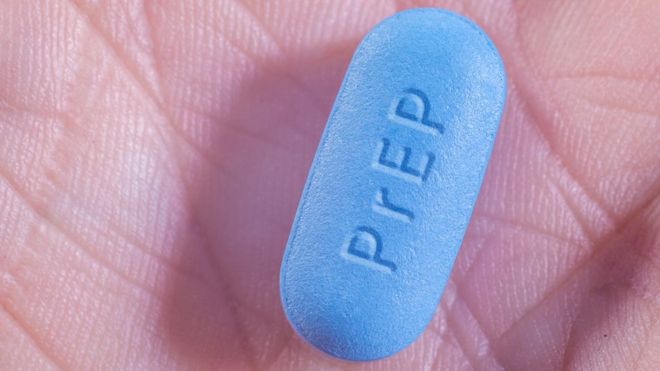
Prep: HIV ‘game-changer’ to reach NHS in England from SeptemberTrials suggest it can cut the risk of being infected by up to 86%.
The NHS in England has announced it will finally give people a drug to dramatically reduce the risk of being infected with HIV, from next month.
The health service had previously fought against paying for Prep and even took the issue to court, unsuccessfully, last year.
The drug will be given to 10,000 people in a £10m trial lasting three years. The Terrence Higgins Trust said it was “crucial” the NHS delivered plans to offer the protection routinely.
Prep (pre-exposure prophylaxis) is a daily pill that disables HIV before it gets a stranglehold in the body. Trials suggest it can cut the risk of being infected by up to 86%. People buying the drug privately has been linked to the first fall in new infections in gay men.
Scotland has already announced it will make Prep available on the NHS to people at risk of HIV. And in Wales, the government is also trialling the drug.
‘Supercharge’
Sexual health clinics in London, Brighton, Manchester, Liverpool and Sheffield are expected to be the first to offer Prep to high-risk people, starting September. The rest of the country will take part by April 2018. Simon Stevens, the chief executive of NHS England, said: “This major new intervention should complement and supercharge the wide-ranging and increasingly successful effort to prevent HIV.
“It’s another milestone in more than three decades’ worth of progress in tackling one of humanity’s major health challenges.” NHS England had fought not to offer the drug, arguing responsibility for paying for it should fall to local authorities, not the NHS. The trial will aim to answer questions about how Prep should be offered on a wide scale across England.
Harry Dodd, 25, is one of about 500 gay men in England who are taking Prep as part of a trial called Proud. He says: “I’ve seen the panic on the face of previous boyfriends when they are awaiting their [HIV test] results – it’s a huge fear, and it affects everything you do. “To be able to have sex without having that fear hanging over you all the time is huge.” Harry says taking Prep has still not become socially acceptable.
“Too many people seem to think it will encourage a hedonistic lifestyle, but for me this is about saving lives,” he says. “People reacted with cynicism when the contraceptive pill for women was first introduced.
“For me, taking Prep has helped me to trust again, have relationships and build bridges, and that shouldn’t be taken away.”
Ian Green, Chief Executive of the Terrence Higgins Trust, said: “the priority must now be to make sure that the trial reaches everyone at risk of HIV, and that it is rolled out speedily across the whole country, by the end of this year at the very latest – spring 2018 is not soon enough.
“To make sure no-one at risk of HIV is left behind, it is crucial that at the end of this trial, a clear process for routinely commissioning Prep on the NHS is agreed.”
Deborah Gold, the Chief Executive at the National Aids Trust, said: “this is a pivotal moment in the fight against HIV. “Prep, if targeted properly at those in need and at high risk of HIV, offers the possibility of transforming the English HIV epidemic.
“We warmly welcome this announcement”.
WHAT IS PANCAP?
PANCAP is a Caribbean regional partnership of governments, regional civil society organisations, regional institutions and organisations, bilateral and multilateral agencies and contributing donor partners established on 14 February 2001. PANCAP provides a structured and unified approach to the Caribbean’s response to the HIV epidemic, and coordinates the response through the Caribbean Regional Strategic Framework on HIV and AIDS to maximise efficient use of resources and increase impact, mobilise resources and build the capacity of partners.
What are the Global AIDS Strategy 2021–2026 targets and commitments?
If targets and commitments in the strategy are achieved:
- The number of people who newly acquire HIV will decrease from 1.7 million in 2019 to less than 370 000 by 2025
- The number of people dying from AIDS-related illnesses will decrease from 690 000 in 2019 to less than 250 000 in 2025.
- The goal of eliminating new HIV infections among children will see the number of new HIV infections drop from 150,000 in 2019 to less than 22,000 in 2025.
What are the 95-95-95 Targets for ending AIDS?
- 95% of People Living with HIV know their HIV status;
- 95% of people who know their status on treatment; and
- 95% of people on treatment with suppressed viral loads.
HELPFUL LINKS:
Global AIDS Strategy 2021–2026, End Inequalities, End AIDS
https://pancap.org/pancap-documents/global-aids-strategy-2021-2026-end-inequalities-end-aids/
Caribbean Regional Strategic Framework on HIV and AIDS (CRSF) 2019-2025
https://pancap.org/pancap-documents/caribbean-regional-strategic-framework-2019-2025/
